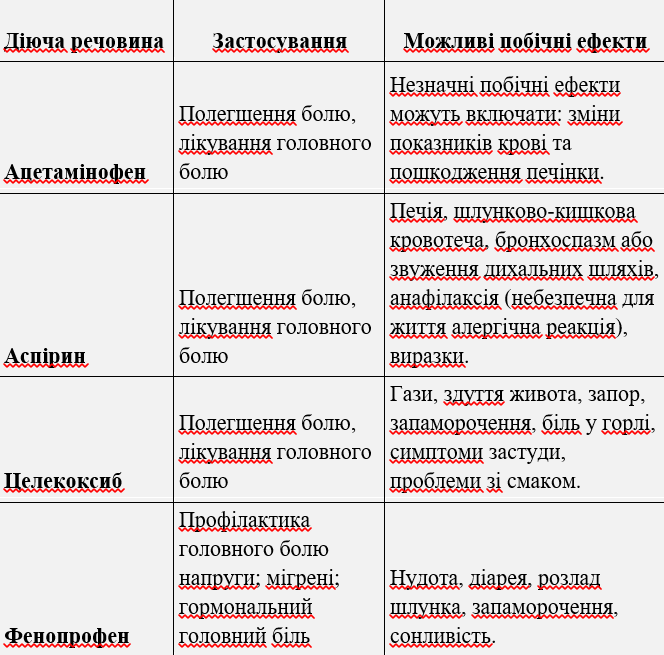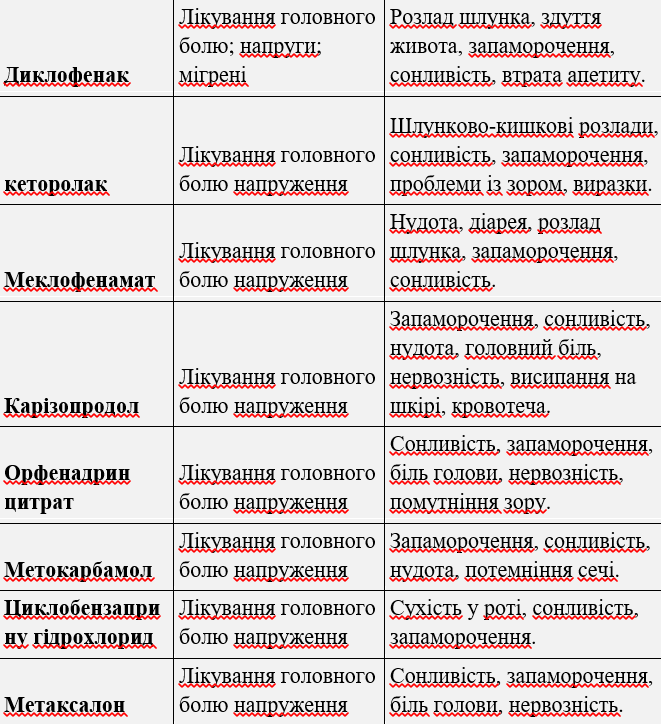Top drugs for the treatment of all types of headaches

So that the head does not hurt: drugs for the treatment of migraine
When you have a headache, it seems that time stops and nothing else happens in the world except for your excruciating pain. It is impossible to stop a merciless migraine without auxiliary means. Taking a painkiller is the first thing that doctors recommend in such cases. Many of these drugs are available without a prescription, but there are also prescription drugs that will not be sold to you without a doctor's prescription.
If you take painkillers more than twice a week, you should consult a doctor who will prescribe preventive therapy. After all, abuse of symptomatic drugs can cause more frequent headaches or worsen migraine symptoms, doctors say. What are the drugs for the treatment and prevention of different types of headache and migraine? How and when to take and what to consider during therapy?
Medicines to relieve symptoms
From time to time, each of us has headaches, the symptoms of which can vary from mild to severe. We may experience a tension headache or migraine. Although headaches can usually be treated with over-the-counter pain relievers. For more severe pain or recurring attacks, prescription medications may be needed.
Over-the-counter medications are non-steroidal anti-inflammatory drugs that relieve the fever, pain, and tension that we experience with headaches.
The most popular painkillers include:
- ibuprofen;
- acetaminophen;
- aspirin;
- naproxen sodium.
Although over-the-counter medications are safe when used as directed, however, according to experts, the following precautions should be kept in mind:
- study the active ingredients of each drug;
- do not exceed the dosage indicated on the package;
- consult a doctor before taking drugs containing aspirin, ibuprofen, naproxen or other NSAIDs;
- be careful if you have bleeding, asthma, ulcers, kidney or liver disease; are taking blood thinners.




Ibuprofen: headache relief
In a 2015 study, scientists looked at the benefits of ibuprofen for people with frequent tension headaches. The researchers concluded that patients with severe headaches with moderate to severe initial pain who took ibuprofen experienced relief for up to 2 hours. Ibuprofen is also effective for symptoms of inflammation such as arthritis and joint pain. Doctors recommend taking the drug from 200 to 600 mg per day. Experts do not advise pregnant women to take ibuprofen to treat headaches, but nursing mothers can take the drug.
The most common side effects of ibuprofen include:
- headaches, dizziness;
- nausea and vomiting;
- diarrhea and upset stomach;
- stomach ache;
- sensitivity of the skin to sunlight.
Aspirin
Aspirin effectively relieves headaches. The usual dose of the drug is one or two tablets of 300 mg every 4-6 hours. Doctors may prescribe low doses during pregnancy. Aspirin is not recommended for children under 16 years of age, as they may develop Reye's syndrome, which is characterized by liver failure.
Prescription painkillers:
If over-the-counter medications are not effective enough, the doctor may prescribe the following types of prescription pain relievers:
- triptans such as sumatriptan;
- naproxen;
- oxaprozin;
- indomethacin;
- nabumetone;
- diclofenac
Doctors determine the specific dose of each preparation individually when issuing a prescription. The drugs are effective for the treatment of tension headaches and migraines. Upset stomach, bloating, dizziness, drowsiness, loss of appetite are the most common side effects of prescription pain medications.
Opioid drugs, antidepressants, muscle relaxants
Doctors may also prescribe opioids and antidepressants for complex treatment of persistent, severe, or moderate headaches and migraines. Opioids (oxycodone, codeine, tramadol) can have serious side effects and risks, including overdose and addiction. They also often lead to a withdrawal syndrome when therapy is abruptly stopped.
To prevent migraines, doctors also use tricyclic antidepressants - amitriptyline and nortriptyline. Selective serotonin reuptake inhibitors can effectively reduce the intensity of tension headaches.
Muscle relaxants such as tizanidine (Zanaflex) are effective in relieving muscle tension and stiffness that can lead to tension headaches. The drug can cause such side effects as constipation, abdominal pain, diarrhea, vomiting, heartburn, numbness of hands and feet, drowsiness, muscle spasms.
To relieve a headache, it is important not only to take drugs, but also to lead an active, healthy lifestyle. Doctors recommend getting enough sleep, exercising, and walking in the fresh air every day. Such relaxation methods as meditation, yoga and massage reduce stress, help eliminate tension, spasms and headaches. However, if you suffer from headaches for a long time, the first thing you should do is to undergo a comprehensive examination by a doctor.
